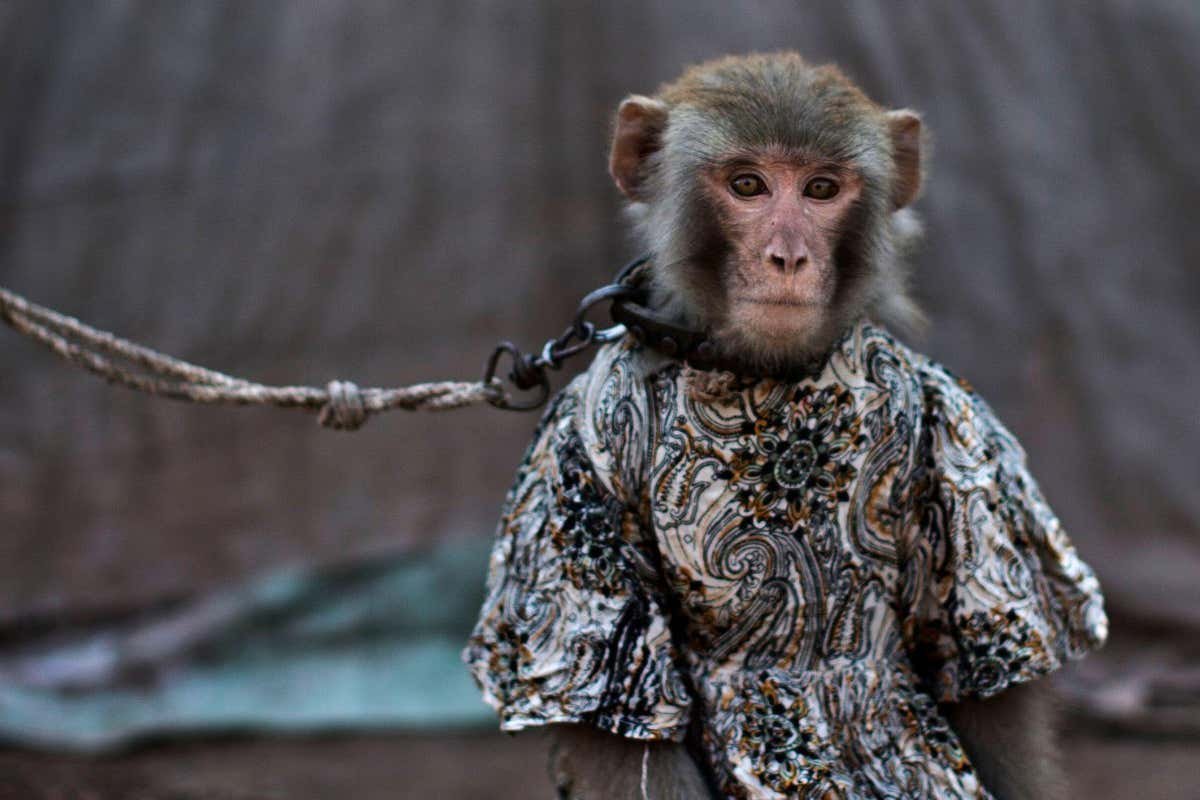
A trained monkey in Rawalpindi, Pakistan
Associated Press / Alamy
Monkeys that “dance” in street shows in Pakistan have high levels of stress hormones, abnormal behaviour and poor health – but stopping such shows would create a welfare crisis for trainers and their families, researchers say.
Taken from the wild as infants, rhesus macaques are kept by travelling trainers throughout South and South-East Asia and made to perform dance steps, tricks and acrobatics on short leashes. While some audiences find the performances “cute” and “funny”, hair analyses have confirmed that the animals live with constant and dangerous levels of stress.
The findings underline the cruel reality of a trade based on hierarchical trade groups that keep both the monkeys and their low-income trainers in difficult circumstances, says Mishaal Akbar at the University of Glasgow, UK.
“It’s as much of a human rights and human welfare issue as it is an animal rights and animal welfare issue,” she says.
Having grown up in Pakistan, Akbar wanted to investigate the plight of these “highly social and intelligent” dancing monkeys, which are subjected to chaining, beating and starvation during their training. Current legislation doesn’t effectively protect the animals, she says.
Akbar teamed up with Neil Evans, also at the University of Glasgow, to determine the animals’ long-term stress hormone levels through their hair samples, which record any alterations in normal hormone activity over the previous three months.
After gaining the approval of group leaders to speak with the trainers working under them, the pair collected a few strands of hair from the chests and shoulders of 50 rhesus macaques (Macaca mulatta) used in dancing monkey shows in and around Islamabad, Pakistan. All but two of the monkeys were males, which are preferred in the trade since they are larger and assumed to attract more attention from tourists. To compare, the researchers also clipped chest hairs from 77 rhesus macaques living freely in a primate sanctuary with minimal human intervention in Florida.
Akbar and Evans found that average concentrations of cortisol, a stress hormone, were 55 per cent higher in the fur of performing monkeys compared with that of sanctuary monkeys. Meanwhile, the average testosterone concentrations in the male performing monkeys were 55 per cent lower. Low testosterone may signify that the male monkeys have accepted their trainers as dominant over them, says Akbar.
The dancing monkeys commonly showed signs of fear and aggressive actions during performances, poor body condition and abnormal behaviours such as finger-sucking and self-biting. They also had significantly shorter lifespans, living to an average of 12 years old compared with an average of 27 years old among the sanctuary monkeys.
“I think it’s to be expected that monkeys that are kept in conditions like the dancing monkeys in Pakistan are going to have higher stress and poorer health,” says Amanda Dettmer at Yale University. A part of the issue is that many people don’t recognise what unhappy monkeys look like, she says. “People think a monkey is smiling at them, and they think it’s cute and funny, when actually it’s a fear gesture.”
Trainers – who are usually groomed as children to join their trade group, or baradari, by family members – understand that their monkeys live difficult lives, says Akbar. Even so, these trainers say they and their families would face even greater difficulty without the income generated by their dancing monkey shows.
Because trainers work on a pyramid-like scheme – paying group leaders within their baradari a percentage of their income – the men have a professional and cultural obligation to continue the trade, at the risk of losing their jobs and their homes.
“One of the reasons they’re continuing in this trade is because they want to put their children through school, so they don’t have to be in the profession,” says Akbar. “[We should avoid] demonising specific communities who are forced to take part in it for their own livelihoods.”
“It’s a difficult problem,” says Jerrold Meyer at the University of Massachusetts Amherst. He hopes the findings can put pressure on authorities to “crack down on how these animals are being treated”, he says.
Offering a sustainable alternative to dancing monkey trainers – an approach that helped end the dancing bear trade in India – may provide relief to both humans and monkeys, says Akbar.
Topics:

Felecia Phillips Ollie DD (h.c.) is the inspiring leader and founder of The Equality Network LLC (TEN). With a background in coaching, travel, and a career in news, Felecia brings a unique perspective to promoting diversity and inclusion. Holding a Bachelor’s Degree in English/Communications, she is passionate about creating a more inclusive future. From graduating from Mississippi Valley State University to leading initiatives like the Washington State Department of Ecology’s Equal Employment Opportunity Program, Felecia is dedicated to making a positive impact. Join her journey on our blog as she shares insights and leads the charge for equity through The Equality Network.




